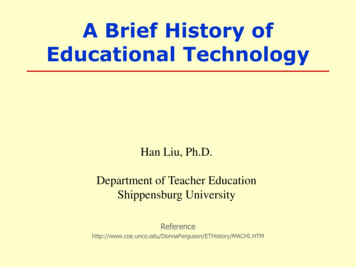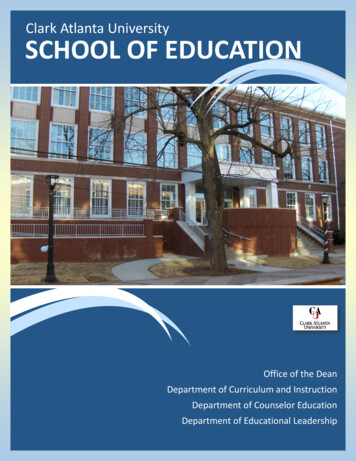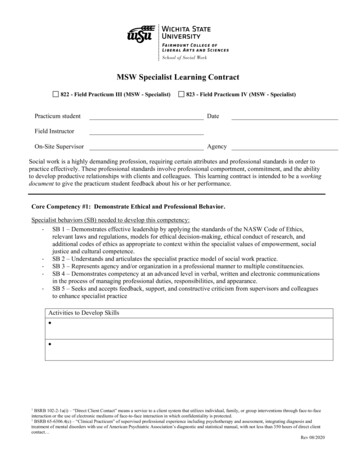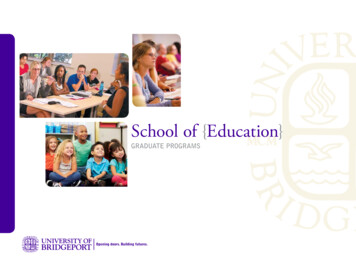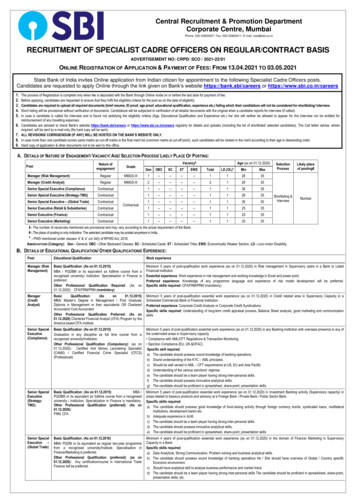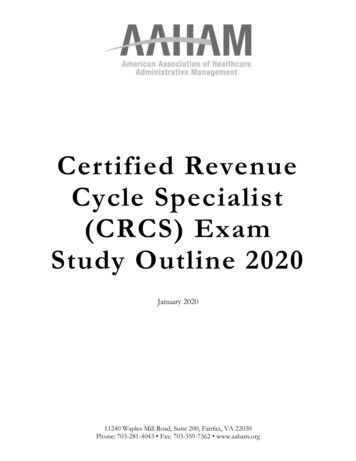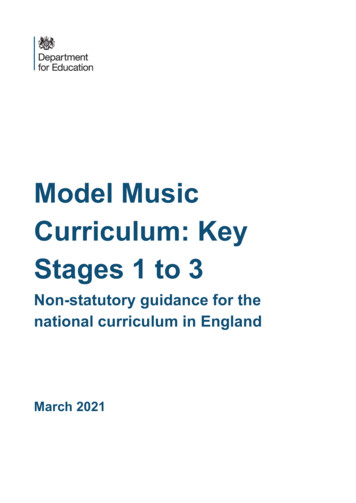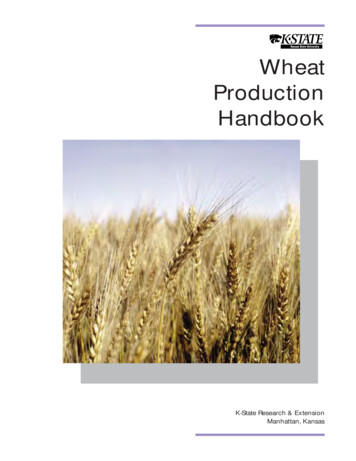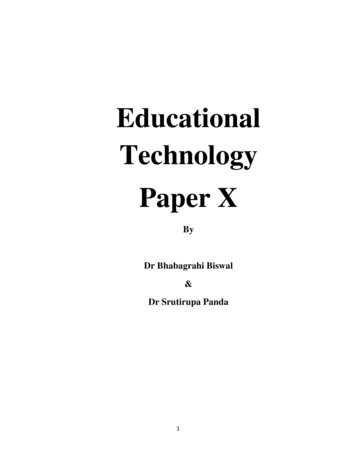
Transcription
ΨEducational Specialist Programin School Psychology2021-2022 HandbookDepartment of Psychology & CounselingUniversity of Central ArkansasProgram Director: Dr. Joan Simon, jsimon@uca.edu1
TABLE OF CONTENTSI.Program Overview .3A. Mission & Philosophy3B. Competency Areas & Objectives3C. University and Program Accreditation7D. Support for Diversity7E. Type of Student / Undergraduate Pathway & Mentoring Program8F. Student Support Opportunities and Resources8G. Professional Ethics9II.Program Requirements .10A. Program Curriculum & Review Process10B. Program Outcomes/Requirements14III.Post-Graduate Employment and Professional Development .21A. Post-Graduate Employment21B. Post-Graduate Professional Development21IV.Additional Information .21A. Graduate Assistantships and Other Forms of Financial Assistance21B. Resources for School Psychology Students22Appendix A: Ed.S. Program – Annual Review Form23Appendix B: Student Corrective Action Plan25Appendix C: Individual Student-Advisor Review27Appendix D: Graduate Faculty29Appendix E: CAPS & Psi Chi Information302
Educational Specialist Programin School PsychologyI. PROGRAM OVERVIEWA.Mission and PhilosophyThe mission of the specialist-level School Psychology Program at the University of CentralArkansas is to prepare entry level school psychologists to apply scientifically basedpsychological and educational principles and practices in all dimensions of their professionalwork. Graduates of the program are expected to be competent, effective, and reflectiveprofessionals committed to the increased understanding of human behavior, continuingprofessional development, best practices in school psychology, cultural respect and diversity, andethical standards of professional practice as articulated by the American PsychologicalAssociation (APA) and the National Association of School Psychologists (NASP).The program is grounded in the philosophical and ethical foundations of the APA, which statethat: “Psychologists are committed to increasing scientific and professional knowledge ofbehavior and people's understanding of themselves and others and to the use of such knowledgeto improve the condition of individuals, organizations, and society. Psychologists respect andprotect civil and human rights and the central importance of freedom of inquiry and expressionin research, teaching, and publication. They strive to help the public in developing informedjudgments and choices concerning human behavior.” (From preamble of the Ethical Principlesof Psychologists and Code of Conduct, APA, 2016, See: www.apa.org/ethics/code)Following the tenets of the NASP Practice Model, the program also promotes evidence-basedservices for children and youth that help them succeed academically, socially, behaviorally, andemotionally. In providing such services, school psychologists “work with parents, educators, andother professionals to create supportive learning and social environments for all children.”(National Association of School Psychologists’ Professional Standards, fication/professional-ethics)B.Competency Areas & ObjectivesGraduates will demonstrate effective knowledge and skills in the following seven corecompetency areas. These competencies represent an integration of standards and domains ofschool psychology training and practice from the American Psychological Association and theNational Association of School Psychologists. Specific objectives are listed for each area, alongwith the courses and applied experiences that most directly support the area.1.Data-based decision making and accountability practices in all professionalactivities and interactions.Objectives include (but are not limited to) the following:oto define problem areas, strengths, and needs at the individual, group, and systems levelthrough systematic assessmentoto empirically measure outcomes of decisions and interventionsoto use scientific knowledge and research in making decisions and in selecting,developing, and evaluating professional actions and interventions3
Curricular Support for this competency area includes (but is not limited to):oP6313Psycho-educational Assessment IoP6316Psychopathology and Developmental Disorders in ChildrenoP6375Professional School PsychologyoP6376Psycho-educational Assessment IIoP8305Psycho-educational Intervention IoP8310Psycho-educational Intervention IIoP6332/3School Psychology PracticumoP6342Internship (in School Psychology)2.Interpersonal communication, collaboration, and consultation within and betweenschool and family.Objectives include (but are not limited to) the following:oto listen and understand the perspectives of others in professional relationships at theindividual, group, and systems leveloto effectively communicate orally and in writingoto conduct problem-solving consultations with parents, teachers, administrators, andothersoto facilitate collaboration and partnerships among key constituent groups (e.g.,facilitation of home/school/community partnerships)Curricular Support for this competency area includes (but is not limited to):oP6355Multicultural Issues in Psychology and CounselingoP6373Individual and Organizational ConsultationoP6375Professional School PsychologyoP6332/3School Psychology PracticumoP6342Internship (in School Psychology)3.Interventions and instructional support / mental health services to developchildren’s academic, social, and life skills.Objectives include (but are not limited to) the following:oto implement wellness and prevention programs to enhance children’scognitive/academic skills and social skills at the individual, group, and systems leveloto implement a broad array of empirically based interventions to correct and improvechildren’s cognitive/academic and social skillsoto provide therapeutic counseling services for students experiencing learning andadjustment problemsCurricular Support for this competency area includes (but is not limited to):oP6316Psychopathology & Developmental Disorders in ChildrenoP6315Applied Behavior AnalysisoP6354Theories of Psychotherapy and CounselingoP6356Group Psychotherapy and CounselingoP6370Advanced Developmental PsychologyoP6372Psychopharmacology4
ooooP8305P8310P6332/3P6342Psycho-educational Intervention IPsycho-educational Intervention IISchool Psychology PracticumInternship (in School Psychology)4.School-wide preventative and responsive services to promote learning.Objectives include (but are not limited to) the following:oto understand the structure, operation, and influence of key systems in the lives ofchildren and adolescents including school, family, and peer systemsoto provide systems-level programmatic consultation and intervention services includingassistance to large agencies serving children and youth (e.g., State Department ofEducation), school districts, and familiesCurricular Support for this competency area includes (but is not limited to):oP6355Multicultural Issues in Psychology and CounselingoP6373Individual and Organizational ConsultationoP6375Professional School PsychologyoP6332/3School Psychology PracticumoP6342Internship (in School Psychology)5.Diversity in development and learning.Objectives include (but are not limited to) the following:oto understand the unique and complex array of cultural influences on individualdevelopment, including racial, ethnic, gender, and linguistic factorsoto work effectively with individuals from a variety of cultural backgrounds byconsidering unique culture-related challenges, strengths, and resources throughout theproblem-solving process.Curricular Support for this competency area includes (but is not limited to):oP6354Theories of Psychotherapy and CounselingoP6355Multicultural Issues in Psychology and CounselingoP6373Individual and Organizational ConsultationoP6370Advanced Developmental PsychologyoP6332/3School Psychology PracticumoP6342Internship (in School Psychology)6.Research and program evaluation.Objectives include (but are not limited to) the following:oto understand research design and statistics to effectively evaluate empirical studies in theprofessional literatureoto conduct research from initial design through evaluation to contribute to schoolpsychology’s empirical knowledge baseoto conduct research on the effectiveness of one’s own workoto conduct program evaluation research5
Curricular Support for this competency area includes (but is not limited to):oP6315Applied Behavior AnalysisoC6360Research Methods in CounselingoP6332/3School Psychology PracticumoP6342Internship (in School Psychology)7.Legal, ethical, and professional practices.Objectives include (but are not limited to) the following:oto understand all appropriate legal, ethical, and professional standards pertaining to thepractice of school psychology to adhere to the legal, ethical, and professional standards ofschool psychology in field experiences such as practicum and internship and otherprofessional practice contextsoto understand major factors impacting the profession of school psychology and toadvocate for the profession to preserve and protect the welfare of children and othersoto promote and ensure appropriate and high-quality services for children and other clientsin one’s own practice and in the practice of othersoto take responsibility for continuing professional development as professional schoolpsychologistsCurricular Support for this competency area includes (but is not limited to):oP6375Professional School PsychologyoP6398Legal and Ethical Issues in Psychology and CounselingoP6332/3School Psychology PracticumoP6342Internship (in School Psychology)This cohesive set of competencies are deemed essential to the effective and comprehensivepractice of school psychology in any setting. Although listed separately, they overlapconsiderably in training and practice and cut across a variety of service functions (e.g.,assessment, prevention/intervention, consultation, research / evaluation) and servicelevels/contexts (e.g., child, family, organizational, community). Students are also expected tohave knowledge of information technology relevant to all areas of competency and to usetechnology in ways that safeguard or enhance the quality of services. Some examples of ways inwhich students use their technology skills in the program include email usage, Internet searches,ERIC or PsychINFO searches, PowerPoint presentations, word processing for assignments andreports, statistical programs, and test scoring programs.The program is responsive to anticipated needs of the future in that graduates will be prepared toaddress the increasingly diverse and complex social, cultural, and psychological needs of youth.Recent changes in these needs have led to new and sophisticated trends in the delivery of schoolpsychological services to children, adolescents, and their caregivers (e.g., parents, teachers).Graduates will be qualified to contribute substantially to the following needs and service trends:oprovision of behavioral and academic interventions in the schools, where they can bedelivered most immediately and effectivelyoprimary and secondary prevention services, in addition to tertiary prevention servicesoprovision of culturally responsive curriculum and other helping services to school-aged6
oostudents, parents, and school staff of all backgroundsinclusion of all persons with disabilities into school and societyincreased emphasis on early detection and intervention for preschool children withsignificant behavioral, cognitive, physical, and psychological challenges the need forresearch and dissemination pertaining to wellness and remedial programs for children andyouthThe emphasis of the School Psychology Program is on prevention and intervention serviceswithin the context of data-based decision making. While preparing students to deal effectivelywith pathology and difficulties at the individual and systems level, the program also preparesstudents to identify and utilize strengths and resources of individuals and systems in accordancewith a wellness/positive psychology model. A description of the curricula is provided later in thehandbook.The faculty of the Department of Psychology and Counseling are dedicated to working withstudents in a close mentoring relationship to prepare students for professional practice. Theyencourage students to pursue outside experiences and professional interactions (e.g., studentmembership in professional organizations and presentations at regional and nationalconferences). In particular, faculty in the school psychology program and in the Department ofPsychology and Counseling are dedicated to working with students from diverse andmulticultural backgrounds and are particularly interested in promoting the achievements ofstudents from under-represented populations. Information regarding the graduate faculty isprovided at the end of the handbook.C.University and Program AccreditationThe University of Central Arkansas is accredited by the Commission on Institutions of HigherEducation of the North Central Association of Colleges and Schools as a bachelor's, master’s,specialist, and doctoral degree granting institution. The UCA Graduate School adheres to theGuidelines of the Council of Graduate Schools in the United States, and the school psychologyprogram adheres to the Council’s charge to protect the rights of students.The Educational Specialist program in school psychology is fully accredited by the NationalAssociation of School Psychologists (NASP) and has been consistently since the 1990’s.D.Support for DiversityThe program has made a strong commitment to supporting diversity. Following theguidelines of the APA, the program faculty makes systematic, coherent, and long-term efforts toattract and retain students and faculty from differing ethnic, racial, and personal backgroundsinto the program. Consistent with such efforts, it acts to ensure a supportive and encouraginglearning environment appropriate for the training of diverse individuals and the provision oftraining opportunities for a broad spectrum of individuals. Further, the program avoids anyactions that would restrict program access on grounds that are irrelevant to success in graduatetraining. The program has and implements a thoughtful and coherent plan to provide studentswith relevant knowledge and experiences about the role of cultural and individual diversity inpsychological phenomena as they relate to the science and practice of school psychology. Thisemphasis is embedded throughout the curriculum.7
E.Type of Student / Undergraduate Pathway & Mentoring ProgramThe program is designed for dynamic students with a genuine commitment to the schoolpsychology profession and to the ethical service to children, families, schools, and communities.The typical student should be open-minded and eager to learn as much as possible about workingwith individual students, classrooms, schools, service agencies, families, and communities. Thestudent needs to be a child advocate who is well-grounded in the theoretical and practical aspectsof school psychology.To connect with undergraduate students who would potentially be interested in schoolpsychology as a profession, we’ve created the Undergraduate Pathway & Mentoring Program tooffer students early admission into the program and mentor them as they successfully completetheir undergraduate degree and develop the skills needed to enter the program. We believe thatstudents who meet and continue to meet our requirements of UPMP admission have the skillsand abilities to successfully engage in graduate study.Freshmen and sophomore Psychology and Education majors are eligible for admission to theSchool Psychology UPMP. Admission to the UPMP means that students are on track to beadmitted to the School Psychology Specialist (Ed.S.) degree program. Students who maintain thenecessary requirements and pass a background check will be admitted to the School PsychologyEd.S. program after a successful interview and completion of their baccalaureate degree.F.Student Support Opportunities and ResourcesThe Psychology and Counseling Department is committed to supporting student’sgraduate school experience. In addition to ongoing informal opportunities for faculty-studentcommunication and mentoring, the department supports student success in numerous ways:student-to-student mentoring, faculty advising, professional conference attendance, and a studentsupport organization.1.Student-to-student mentoring. Each incoming student is assigned to an existinggraduate student from the program for mentoring purposes. The role of the mentor is to provideinformation regarding the program from a student’s perspective. The specific arrangement andform of mentoring are determined by each pair of students.2.Faculty advising. Each student is assigned an academic advisor from the departmentupon admission to the M.S. program. The advisor is available to support the student in a varietyof ways including program planning and scheduling, corrective intervention, and careerexploration.3.Professional conference attendance. All faculty members within the Department ofPsychology & Counseling encourage students to attend appropriate professional conferences andworkshops. In this program, conferences and workshops sponsored by the Arkansas SchoolPsychology Association, the National Association of School Psychologists, and the AmericanPsychological Association are most meaningful to the students. Students often have theopportunity to co-present research with faculty at these conferences, and there are plenty ofopportunities for informal interaction with faculty at these times. There are departmental fundsavailable to assist students who are presenting at a professional conference.8
4.Departmental graduate student organization. The Graduate Association ofCounseling and Psychology Students (CAPS) is a student organization available to all students inthe department’s graduate programs. Its mission is to promote cohesion and representation ofpsychology and counseling graduate students at the University of Central Arkansas. Theobjectives of the association are to welcome and orient new graduate students to the Departmentof Psychology and Counseling, to maintain productive faculty-student communication, toprovide academic and social support for students, and to promote ongoing growth andimprovement of Psychology and Counseling graduate programs.5.Other resources. Other sources of support for students include campus housing, easyaccess and full use of the university library system, grant-related opportunities, research funding,electronic mail/internet access, use of the department’s computer lab, and use of the College ofEducation’s Technology Learning Center, Office of Candidate Services and Field Experiences,computer labs, and distance learning lab.G.Professional EthicsStudents enrolled in the Ed.S. Program are expected to adhere to and uphold the ethicalcodes and standards of the APA (Ethical Principles of Psychologists and Code of Conduct, 2016;https://www.apa.org/ethics/code/index) and NASP (Principles for Professional Ethics, NASP,2020: fessional-ethics)9
II. PROGRAM REQUIREMENTSThe following section is divided into two parts: (A) the program curriculum and informationabout the review process and (B) the six major program outcomes / requirements.A.1.Program Curriculum & Review ProcessProgram CurriculumYEAR 1SummerP6372 PsychopharmacologyP6316 Psychopathology & Developmental Disorders in ChildrenFallP6398 Legal and Ethical Issues in Psychology and CounselingP6375 Professional School PsychologyP6354 Theories of Psychotherapy and CounselingP6370 Advanced Developmental PsychologySpringC6360 Research Methods in CounselingP6373 Individual and Organizational ConsultationP6313 Psycho-educational Assessment IYEAR 2SummerP6355 Multicultural Issues in CounselingFallP6332 School Psychology Practicum IP6315 Applied Behavior AnalysisP7310 Emotional & Behavioral Assessment of ChildrenP8305 Psycho-educational Intervention ISpringP6376 Psycho-educational Assessment IIP6356 Group CounselingP6333 School Psychology Practicum IIP8310 Psycho-educational Intervention IIYEAR 3Fall & SpringP6342 Internship in Psychology (3 hours per semester)Total Semester Hours: 60After successfully completing all 60 hours and the Praxis II (school psychology) exam, studentsmust pass a criminal background check to be eligible to become a School Psychology Specialistthrough the AR Department of Education. Praxis II exam scores must be sent to Dr. Gary Bunn,UCA License Officer. Praxis II online registration code #5402 should be used to ensure that thescores will be sent to UCA.10
Grades and Quality PointsGrades of A, B, and C will allow students to receive graduate credit representing 4, 3, and 2quality points, respectively. Grades below C are recorded and are considered in determining thequality point ratio but are not accepted toward completion of the graduate program. Studentsreceiving three (3) Cs in graduate courses will be terminated from the program and will not bepermitted to enroll in any other graduate program in the Dept of Psychology & Counseling.Students must earn a “B” or above in the following core school psychology courses:P6375 Professional School PsychologyP6373 Individual and Organizational ConsultationP6313 Psycho-educational Assessment IP6398 Legal and Ethical Issues in Psychology and CounselingP6355 Multicultural Issues in CounselingP6332 School Psychology Practicum IP6315 Applied Behavior AnalysisP8305 Psycho-educational Intervention IP8310 Psycho-educational Intervention IIP6376 Psycho-educational Assessment IIP6333 School Psychology Practicum IIP6342 Internship in Psychology (both semesters)All grades, once reported, remain a matter of permanent record and are averaged into thecumulative GPA. Any appeal or question concerning an assigned grade must be made within onecalendar year of the time the grade was awarded.Calculation of the graduate grade point average includes all residence courseworkattempted. No transfer credit grades are used to calculate the cumulative GPA.A graduate student is expected to maintain a cumulative 3.0 average. A student whosecumulative grade point average is less than this is placed on academic probation. In the nextsemester or summer term in attendance, the student must achieve a cumulative 3.0 average. If thecumulative 3.0 is not met, the student may be ineligible to continue graduate studies at UCA.AttendanceAttendance and tardiness are primarily a student / teacher / class issue, but the department anduniversity are concerned when the student cannot meet these basic obligations. If absencesindicate the student has been negligent about class attendance, registration in the given class maybe canceled, a grade of "WF" recorded and, in flagrant cases, the student may be suspended fromthe University. At the graduate level, students should realize that consistent class attendance andparticipation greatly influence their mastery of the content. Students are expected to exhibit ahigh degree of professionalism as reflected in their speech, other actions, and overall demeanorin class. Prompt and consistent attendance is an essential dimension of professional behavior.Inactive StatusStudents who do not enroll in course work for a semester without written approval of the SchoolPsychology Program Director and the Department Chair will be removed from the graduateprogram and must reapply for admission should they decide to return.11
2.Review ProcessStudent progress is monitored on an ongoing basis. Review of student performance mayoccur on two levels. One level is the annual review, which includes all students in the program.The second level, the individual review, occurs when a student-related problem is documentedand filed with a member of the School Psychology Committee by a faculty member, fieldsupervisor, or other individuals affiliated with the training program.a.Annual Review ProcessThe School Psychology Committee meets formally each year to review each student’s progresson core competencies and program objectives. This review will include the quality of thestudent’s academic work, the appropriateness of the student’s behavior for the profession ofschool psychology, and the appropriateness and professionalism of each student’s relationship toher/his colleagues and professors. Input for annual reviews may be solicited from the student,faculty, and relevant others (e.g., practicum supervisors).In addition, each year the student will submit a professional portfolio (details provided at fallorientation meeting) that includes descriptions of how the student is achieving in each of theprogram’s goal areas and supporting coursework and other professional activities. All documentsgenerated by this process will be placed in the student’s file. None of this correspondence willoccur over the internet.Before the review of the School Psychology Committee, departmental faculty will be asked toprovide input on each student’s performance to the committee. At the SPC meeting, an AnnualReview Form (Form A) will be completed for each student. For any student requiring acorrective action plan, a Student Corrective Action Plan (Form B) will also be completed. Inaddition to problems identified during the formal annual review process, faculty members andothers affiliated with the program may initiate review procedures at any time during the year toaddress problems or concerns. Areas to be reviewed include the nature, severity, andconsequences of the problematic behavior. Regardless of how or when a problem or concern isexpressed, the School Psychology Committee will work together to assess the severity of theproblem and determine whether remediation is an option or if a recommendation for dismissalfrom the program is necessary.b.Individual Review ProcessThe Individual Review Process begins when a concern or complaint is expressed to any memberof the School Psychology Committee, at which point the student’s faculty advisor is informed.The concern or complaint may revolve around academic issues or professional behavior.Examples are listed below.oInability or unwillingness to acquire and integrate professional standards into clinicalpracticeoInability to acquire professional skills and reach an accepted level of competenceexpected of graduate studentsoInability to control personal stress, psychological dysfunction, or emotional issues to theextent that they interfere with training or work with clientsThe faculty advisor sends a written notification to the student requesting a meeting with the12
student. Other persons, for example the faculty person expressing concerns, may be invited toattend, at the discretion of the faculty advisor. If the student is not prompt or helpful in his/herresponse, he/she may refer the matter to the School Psychology Program Director, who maychoose to involve the School Psychology Committee.The student and faculty advisor meet. The faculty advisor completes the Individual StudentAdvisor Review Form (Form C). The faculty advisor makes one of three possible decisions:1.The problem is resolved and requires no formal action (state reasons).2.A Student Corrective Action Plan, to which both parties agree, is developed anddocumented (Form B).3.The faculty advisor has ongoing serious concerns about the problem, or the problemcannot be remediated through a Student Corrective Action Plan, the matter is forwarded to theSchool Psychology Program Director.If the School Psychology Committee becomes involved in the matter, a letter will be sent to thestudent regarding the decision of the committee, and it is the responsibility of the advisor tofollow up and monitor the situation regardless of the specific decision.c.Corrective Action ProceduresA Student Corrective Action Plan (Form B) is used anytime it is determined through an annual orindividual review that a student is failing to make sufficient progress in the program’scoursework or expected professional behaviors. At a minimum, the student and his/her facultyadvisor will complete the form, but input may also be solicited from the School PsychologyProgram Director and/or other members of the School Psychology Committee. The plan willoutline what changes are expected of the student and a timeline for making the changes. The planwill be reviewed periodically at appointed times. A Student Corrective Action Plan couldinclude, but is not limited to, the following options:Additional coursework and/or supervised experiences Reduction in the number of classes taken each semester Change of amount, format, and/or content of supervision Recommend or require individual therapy Recommend leave of absence from program d.Retention, Probation, and DismissalAfter students enroll in the department and Graduate School, they may continue toregister if they make satisfactory progress. Students are considered in good standing if they: (a)have a minimum Grade Point Average (GPA) of 3.0, (b) maintain appropriate professionalism inclass and field settings, (c) observe the rules of ethical conduct as described in the most recentAPA Ethical Principles of Psychologists and Code of Conduct and the NASP ProfessionalConduct Manual, (d) receive successful annual reviews conducted by the department throughouttheir graduate training experience, (e) make satisfactory progress toward completing degreerequirements, and (f) meet the timelines established by the department and Graduate School.Failure to complete departmental requirements within the department’s stated timelines may alsoresult in dismissal by the Graduate School. Students who fail to meet departmental timelines maypetition the program and the Gradu
2021-2022 Handbook Department of Psychology & Counseling . ethical standards of professional practice as articulated by the American Psychological Association (APA) and the National Association of School Psychologists (NASP
